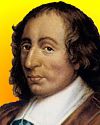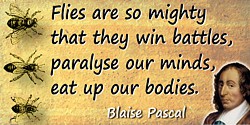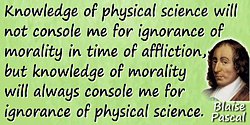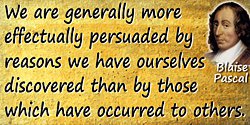 (source)
(source)
|
Blaise Pascal
(19 Jun 1623 - 19 Aug 1662)
French mathematician and physicist who was a child prodigy. In mathematics, he developed a theory of probabilities. In physics, he invented the hydraulic press and formulated Pascal’s Law for pressure.
|
Blaise Pascal Quotes on Knowledge (3 quotes)
>> Click for 72 Science Quotes by Blaise Pascal
>> Click for Blaise Pascal Quotes on | Nature | Reason |
>> Click for 72 Science Quotes by Blaise Pascal
>> Click for Blaise Pascal Quotes on | Nature | Reason |
A game is on, at the other end of this infinite distance, and heads or tails will turn up. What will you wager? According to reason you cannot leave either; according to reason you cannot leave either undone... Yes, but wager you must; there is no option, you have embarked on it. So which will you have. Come. Since you must choose, let us see what concerns you least. You have two things to lose: truth and good, and two things to stake: your reason and your will, your knowledge and your happiness. And your nature has two things to shun: error and misery. Your reason does not suffer by your choosing one more than the other, for you must choose. That is one point cleared. But your happiness? Let us weigh gain and loss in calling heads that God is. Reckon these two chances: if you win, you win all; if you lose, you lose naught. Then do not hesitate, wager that He is.
— Blaise Pascal
Pensées (1670), Section I, aphorism 223. In H. F. Stewart (ed.), Pascal's Pensées (1950), 117-119.
Knowledge of physical science will not console me for ignorance of morality in time of affliction, but knowledge of morality will always console me for ignorance of physical science.
— Blaise Pascal
Pensées (1670), No. 23, translated by A. J. Krailsheimer (1995), 6.
We know that there is an infinite, and we know not its nature. As we know it to be false that numbers are finite, it is therefore true that there is a numerical infinity. But we know not of what kind; it is untrue that it is even, untrue that it is odd; for the addition of a unit does not change its nature; yet it is a number, and every number is odd or even (this certainly holds of every finite number). Thus we may quite well know that there is a God without knowing what He is.
— Blaise Pascal
Pensées (1670), Section 1, aphorism 223. In H. F. Stewart (ed.), Pascal's Pensées (1950), 117.
See also:
- 19 Jun - short biography, births, deaths and events on date of Pascal's birth.
- Blaise Pascal - context of quote “Flies are so mighty” - Medium image (500 x 250 px)
- Blaise Pascal - context of quote “Flies are so mighty” - Large image (800 x 400 px)
- Blaise Pascal - context of quote “Reasons we have ourselves discovered” - Medium image (500 x 250 px)
- Blaise Pascal - context of quote “Reasons we have ourselves discovered” - Large image (800 x 400 px)
- Blaise Pascal - context of quote “Knowledge of morality” - Medium image (500 x 250 px)
- Blaise Pascal - context of quote “Knowledge of morality” - Large image (800 x 400 px)




 In science it often happens that scientists say, 'You know that's a really good argument; my position is mistaken,' and then they would actually change their minds and you never hear that old view from them again. They really do it. It doesn't happen as often as it should, because scientists are human and change is sometimes painful. But it happens every day. I cannot recall the last time something like that happened in politics or religion.
(1987) --
In science it often happens that scientists say, 'You know that's a really good argument; my position is mistaken,' and then they would actually change their minds and you never hear that old view from them again. They really do it. It doesn't happen as often as it should, because scientists are human and change is sometimes painful. But it happens every day. I cannot recall the last time something like that happened in politics or religion.
(1987) -- 


